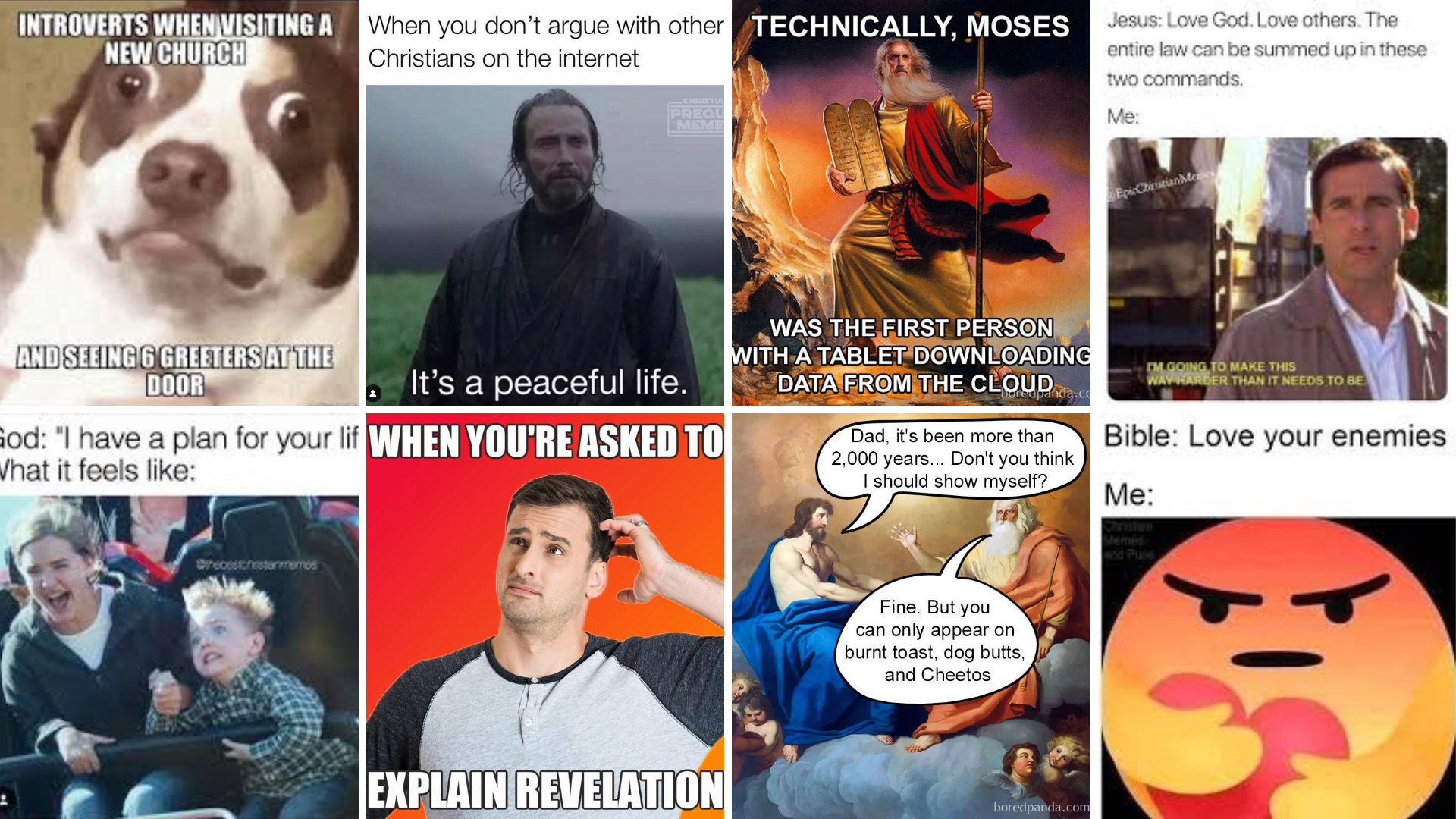This article is adapted from a seminar delivered to students at the Unite West youth conference in San Diego, California, in July.
In the last several decades, as popular discourse has transitioned from print media like magazines and newspapers to online platforms like blogs, forums, and social media apps, memes have transformed the way many of us communicate—including the ways we communicate about our faith. All you have to do is look for “Christian memes” in a search engine, and you can see page after page of mostly lighthearted, primarily visual jokes that connect in some way to 21st-century Christian culture, however, you wish to define it.
But if we’re to be serious about understanding the ways people communicate, we should pay attention to memes; not just what they mean, but how they originate, why they continue to proliferate, and what that says about our lives, beliefs, and the collective state of our faith.
But first, you might be wondering, what even is a meme? The word is a shortened version of the Greek word mimeme, meaning “something imitated or copied,” and it was initially coined by evolutionary biologist Richard Dawkins when he wanted something similar to the word “gene.” Simply put, memes are ideas that spread through imitation.
Even though the word itself might be new to our common cultural lexicon, the concept is certainly not. Before internet memes dominated the cultural discourse in the 2000s and 2010s, memes were being spread in the ’80s and ’90s through slogans on mugs, T-shirts, wall art, and bumper stickers. “Live, laugh, love” is just as much a meme as rickrolling.
Behaviors can also be memes. Think about the first time you raised your hands in church or the first time you held hands during a time of prayer. Chances are, nobody had to tell you to do it, you just saw others doing it and followed suit. Regardless of the idea or behavior, if you see someone saying or doing something, figure out what it means, and try it yourself (or see someone else do the same), then it qualifies as a meme.
And memes are effective because of two major elements: desire and contextualization.
Wanting What Others Want
French philosopher and social scientist Dr. Rene Girard came up with what he called the theory of memetic desire. “Man is the creature who does not know what to desire,” says Girard. “He turns to others in order to make up his mind. We desire what others desire because we imitate their desires.”
How many times has this happened to you? You see something that someone else possesses, and you didn’t realize you wanted it until that moment. Back in the day, we used to call it “keeping up with the Joneses.” We sometimes see this with little children. One child wants a toy because they see another child having fun with it, we implore that first kid to wait their turn, and then when the second kid is done with it, the first child no longer wants it. The allure is not in the object itself but in the value endowed by others around us.
Social media thrives on this dynamic; after all, what else are likes, shares, and reactions except the quantifying of memetic desire? Anything can become an object of such desire. Advertisers exploit this dynamic by showing us ads for products on social media, but we use memes to satiate many different desires. Maybe we want to draw attention so that others will attend our event, purchase our service, listen to our music, watch our film or TV show, or consume our food products.
Maybe we want to be complimented on our hairstyles and outfits. Maybe we want to enjoy the same kind of idealized relationships we see in the highlights of our friends’ videos, photos, and status updates. Or maybe we just want to win an argument.
Desires of all types, shapes, and sizes cause memes to spread so quickly.

Taking Things Out of Context
Of course, internet memes also spread because they’re decontextualized. When a photo, animated GIF, video clip, or sound effect is used as a meme, it’s removed from its original context, usually to describe some new situation or idea. Often, the humor comes in part because of the tonal dissonance between the original situation and the new one. For example, in the “One Does Not Simply” meme from The Lord of the Rings, the character Boromir says the phrase “One does not simply walk into Mordor,” explaining that Mordor is exceedingly dangerous. But in meme form, he ends up warning people about the difficulties of such droll, ridiculously “impossible” tasks like hitting the snooze button only once or putting a tube of Pringles away without eating one.
Of course, Christians have been taking the Bible out of context for centuries. One could argue that we’re supposed to take the Bible out of context—more specifically, that the job of biblical interpretation is to understand the original context so that we may take the wisdom of the biblical authors and transfer that wisdom out of its original context and into the present day. But without a proper understanding of what the biblical authors were trying to communicate, we run the risk of poorly understanding what biblical texts truly mean. When those misunderstood texts become memes—meaning, people imitate those misunderstood interpretations—that contributes to a lack of biblical literacy and a fundamental misunderstanding of the faith overall.
Take Steph Curry. The four-time NBA champion is outspoken about his Christian faith and is known to write the phrase “I can do all things” on his sneakers as a nod to Philippians 4:13. In this video explaining his embrace of that verse, Curry says that his mother challenged him to find a verse to remind him of his godly purpose during the heat of NBA competition. So far, so good.
But the verse has become a catchphrase for Curry’s fans, many of whom don’t recognize its origin. Highlight videos on YouTube of Curry’s basketball exploits are titled “I can do all things.” The net effect is that the slogan helps to codify the myth of Curry as a basketball superhero, capable of feats that mere mortals can only dream of. Even when people know that it’s a Bible verse and that it’s short for “I can do all things through Christ who strengthens me,” the emphasis is still on Curry’s accomplishments.
But when the apostle Paul wrote those words to the church in Philippi, he was thanking them for their support. At the time, Paul was incarcerated and facing a potential trial by Roman authorities for disturbing the order because of his unflinching willingness to preach the gospel. Because the itinerant nature of his apostolic ministry kept him traveling from place to place, Paul regularly relied on the financial and material support of the churches he helped to establish. Here’s the NIV rendering of that verse with additional context:
I am not saying this because I am in need, for I have learned to be content whatever the circumstances. I know what it is to be in need, and I know what it is to have plenty. I have learned the secret of being content in any and every situation, whether well fed or hungry, whether living in plenty or in want. I can do all this through him who gives me strength.
The latest NIV translation makes it clear—Paul is not saying he can accomplish anything he sets his mind to. Rather, he’s able to prosper under various situations, even those that seems difficult. Y’know, like being broke and imprisoned on bogus charges.
So when a multimillionaire NBA player—who happens to be the son of another NBA millionaire—quotes Philippians 4:13 after he scores a bunch of points in a basketball game….I mean, unless he also quotes it when he has a bad game, experiences a catastrophic injury, or gets cut from the team, he’s a little bit missing the point. And when others copy this meme, they miss the point too.

Benefits and Dangers of Memes
See, the benefits of using memes are exactly the things that make them dangerous. Memes are entertaining, but the humor sometimes distracts people from their distortions and inaccuracies. They can make complicated situations seem simple and easy to follow, but they can border on oversimplification. They’re easily transmissible, which allows potential misinformation from unreliable sources to spread quickly. And while a great meme can help us understand our current situation, a bad meme can actually prevent us from gaining necessary understanding.
If that’s true about internet memes of little eternal importance, it’s even more true about memes that communicate ideas about our faith, our theology, or our politics.
Remember the different kinds of memetic desires? For too many of us, we desire to win arguments more than we desire to have constructive dialogue. In an election year where our society is bitterly divided into opposing factions, memes can have the corrosive effect of hardening our hearts and preventing us from understanding people who come from different political, ethnic, or geographic backgrounds. We read a meme, get a laugh, and enjoy the high from being on the perceived moral high ground.
But with the Spirit’s help, we can reverse this corrosive vortex. Because if we can imitate those peddling falsehoods, we can also imitate others telling the truth. There are plenty of Scriptures about imitation, but perhaps my favorite is from 2 Corinthians 3:2-3 (NIV):
“You yourselves are our letter, written on our hearts, known and read by everyone. You show that you are a letter from Christ, the result of our ministry, written not with ink but with the Spirit of the living God, not on tablets of stone but on tablets of human hearts.”
Here, Paul the apostle is both imploring and reassuring the believers in Corinth that he doesn’t need a formal letter of recommendation because their changed lives are the ultimate validation of his ministry.
For Paul, his life was the meme.
Others imitated him, as he imitated Christ (1 Corinthians 11:1).
Meme Your Faith
This is ultimately what we are called to do as believers of Jesus. We can post supposedly
Christian memes on social media all day every day, but ultimately our distinctive lives as peculiar people (1 Peter 2:9) should be the compelling feature that people want to imitate.
So the next time you wanna post a meme, ask yourself a few questions. Is this what I want people to receive from me and share with others? Is this the best way of meeting the need that I’m feeling? Does this meme truly encapsulate how I’m feeling and what I’m thinking?
If all those answers are yes, then fire away. But chances are, your people need to see you living out your faith in a truly authentic way.
And you don’t need a meme to do that.














